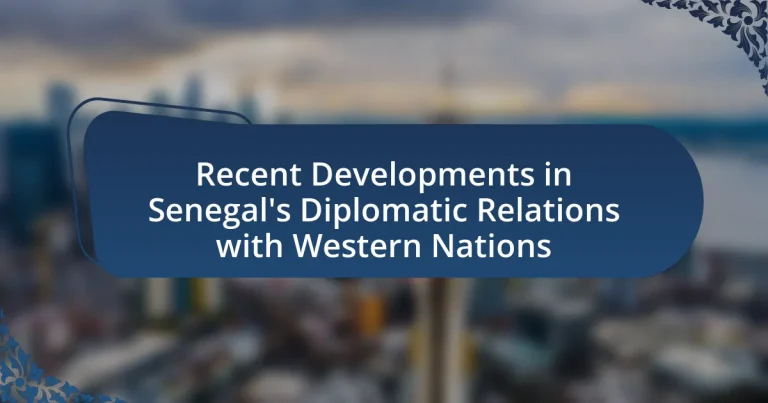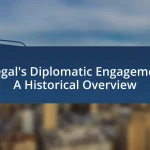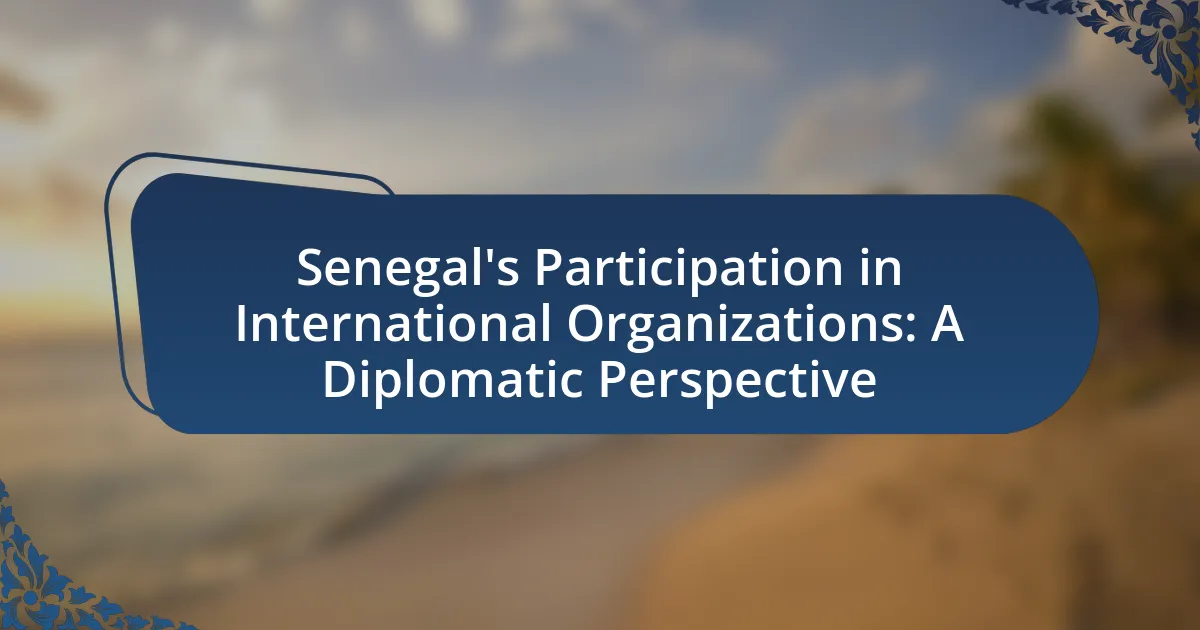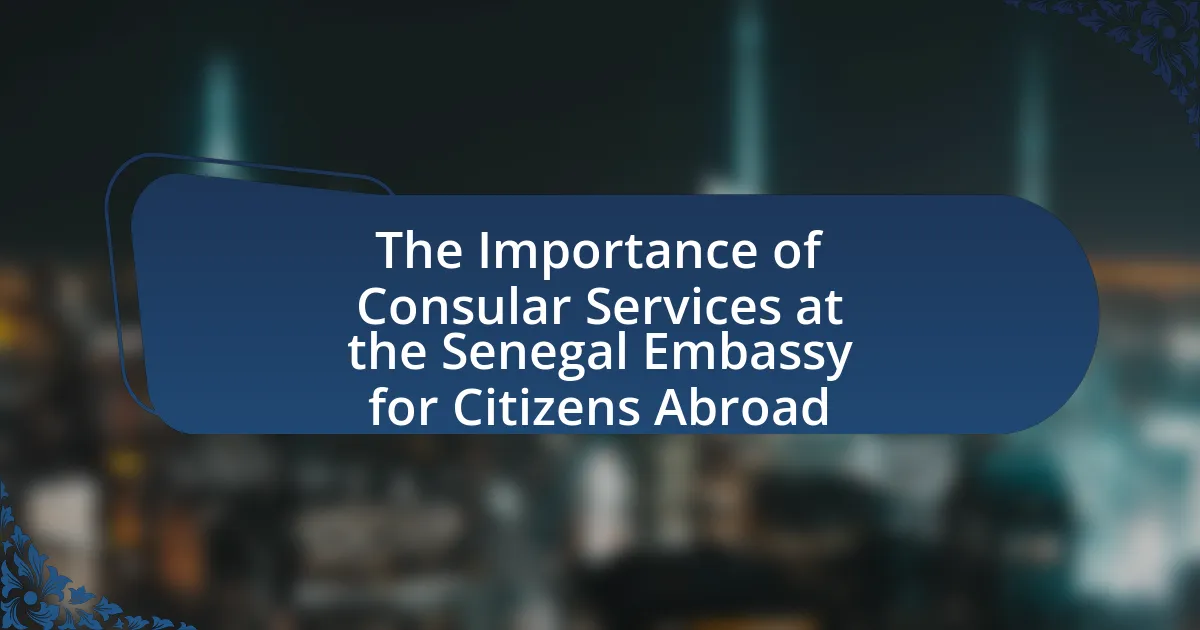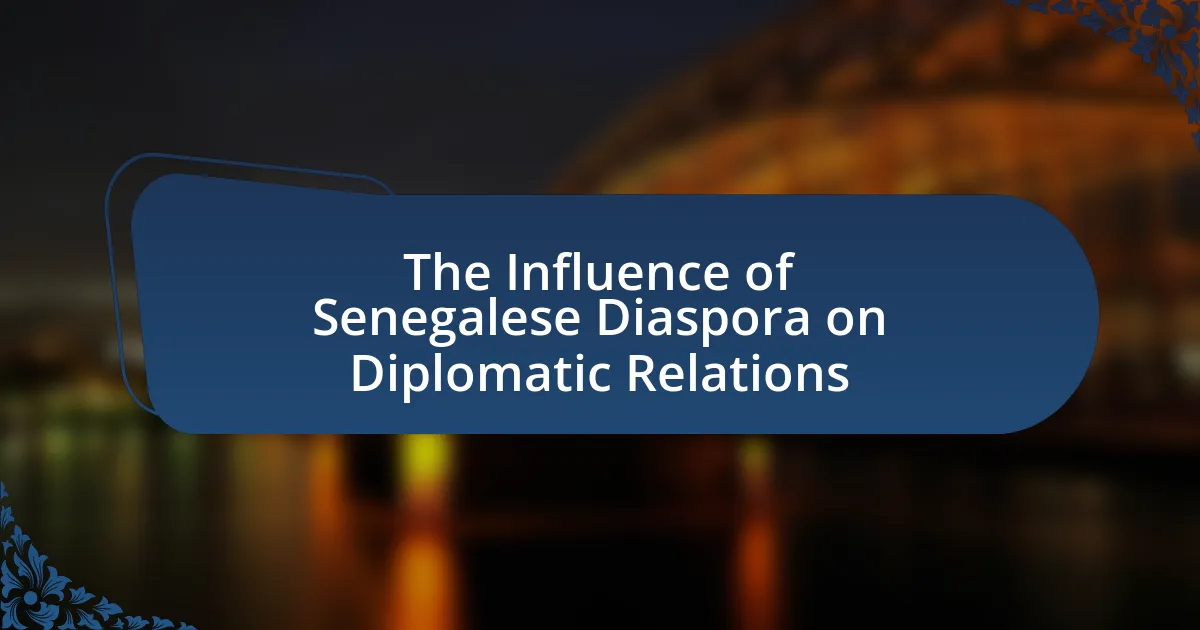The article examines recent developments in Senegal’s diplomatic relations with Western nations, highlighting strengthened partnerships in economic cooperation, security collaboration, and climate change initiatives. Key agreements, such as those with France and the United States, reflect Senegal’s commitment to enhancing trade, investment, and regional stability. Historical ties, particularly with France, have shaped these relationships, while recent political changes and economic interests drive ongoing diplomatic shifts. The article also discusses the implications of these developments for Senegal’s future, including potential impacts on domestic policies and opportunities for economic growth.
What are the Recent Developments in Senegal’s Diplomatic Relations with Western Nations?
Recent developments in Senegal’s diplomatic relations with Western nations include strengthened partnerships focused on economic cooperation, security collaboration, and climate change initiatives. In 2023, Senegal signed a bilateral agreement with France to enhance trade and investment, reflecting a commitment to economic growth. Additionally, Senegal has engaged with the United States to bolster security measures against terrorism in the Sahel region, highlighting a shared interest in regional stability. Furthermore, Senegal’s participation in international climate discussions has garnered support from Western nations, emphasizing its role as a leader in sustainable development in West Africa. These actions demonstrate Senegal’s proactive approach to fostering robust diplomatic ties with Western countries.
How have historical ties influenced current diplomatic relations?
Historical ties have significantly shaped current diplomatic relations between Senegal and Western nations. The legacy of colonialism, particularly French colonial rule, has established a framework for ongoing political, economic, and cultural interactions. For instance, Senegal’s membership in the Francophonie and its close ties with France facilitate diplomatic dialogue and cooperation in various sectors, including trade and security. Additionally, historical connections foster mutual understanding and shared values, which are evident in Senegal’s active participation in international organizations like the United Nations, where it often aligns with Western nations on key global issues. These historical ties create a foundation that influences contemporary diplomatic strategies and partnerships.
What key historical events shaped Senegal’s relationships with Western nations?
Key historical events that shaped Senegal’s relationships with Western nations include its colonization by France, the struggle for independence, and its role in the Cold War. Senegal was a French colony from the 17th century until it gained independence in 1960, which established a foundation for its diplomatic ties with France and other Western countries. The peaceful transition to independence under Léopold Sédar Senghor fostered a positive image in the West, leading to strong bilateral relations. Additionally, during the Cold War, Senegal positioned itself as a non-aligned nation, attracting support from both Western and Eastern blocs, which further solidified its diplomatic relationships. These events collectively influenced Senegal’s ongoing interactions with Western nations, characterized by cooperation in various sectors, including trade, security, and cultural exchange.
How have past diplomatic strategies impacted recent developments?
Past diplomatic strategies have significantly shaped recent developments in Senegal’s relations with Western nations by establishing a foundation of trust and cooperation. For instance, Senegal’s historical alignment with Western powers during the Cold War fostered a stable political environment, which has facilitated ongoing partnerships in trade and security. The 2000s saw Senegal actively engage in initiatives like the African Growth and Opportunity Act (AGOA), which strengthened economic ties with the United States, leading to increased exports and investment. Furthermore, Senegal’s consistent participation in international peacekeeping missions has enhanced its reputation, resulting in stronger diplomatic ties with Western countries, particularly in the context of counter-terrorism efforts in the Sahel region. These historical diplomatic engagements have thus directly influenced Senegal’s current strategic collaborations and foreign policy orientation with Western nations.
What are the main factors driving recent changes in diplomacy?
The main factors driving recent changes in diplomacy include the rise of multipolarity, technological advancements, and shifting global priorities. Multipolarity has led to a more complex international landscape where multiple nations exert influence, necessitating adaptive diplomatic strategies. Technological advancements, particularly in communication and information sharing, have transformed how states engage with one another, allowing for more immediate and transparent interactions. Additionally, shifting global priorities, such as climate change and public health, have prompted nations to collaborate more closely on transnational issues, reshaping traditional diplomatic agendas. These factors collectively influence how countries, including Senegal, navigate their relationships with Western nations.
How do economic interests play a role in these diplomatic shifts?
Economic interests significantly influence diplomatic shifts by driving nations to align their foreign policies with trade and investment opportunities. In the context of Senegal’s recent diplomatic relations with Western nations, the discovery of oil and gas reserves has prompted Western countries to engage more actively with Senegal, seeking partnerships that can enhance energy security and economic growth. For instance, the United States and European nations have increased their investments in Senegal’s energy sector, which has led to a strengthening of diplomatic ties. This economic motivation is evidenced by Senegal’s participation in international energy forums and agreements that facilitate foreign investment, demonstrating how economic interests are central to shaping its diplomatic landscape.
What political changes in Senegal have influenced its foreign relations?
Recent political changes in Senegal, particularly the transition to a more democratic governance structure and increased political stability, have significantly influenced its foreign relations. The election of President Macky Sall in 2012 marked a shift towards greater engagement with Western nations, as his administration prioritized economic reforms and democratic practices. This commitment to democracy has led to strengthened partnerships with countries like France and the United States, who view Senegal as a stable ally in West Africa. Additionally, Senegal’s active participation in regional organizations, such as ECOWAS, has enhanced its diplomatic standing, allowing it to play a mediating role in regional conflicts, which further solidifies its relationships with Western powers seeking stability in the region.
What specific agreements or partnerships have been established recently?
Recently, Senegal established a partnership with the United States focused on security cooperation and economic development. This agreement aims to enhance military collaboration and support Senegal’s efforts in combating terrorism and promoting regional stability. Additionally, Senegal signed a trade agreement with the European Union to facilitate investment and trade, reflecting a commitment to strengthen economic ties and promote sustainable development. These agreements underscore Senegal’s strategic role in West Africa and its proactive approach to fostering international partnerships.
What are the key features of the latest trade agreements with Western nations?
The key features of the latest trade agreements with Western nations include enhanced market access, tariff reductions, and commitments to sustainable development. These agreements aim to facilitate trade by lowering barriers, which can lead to increased exports from Senegal to Western markets. For instance, the agreement with the European Union includes provisions for duty-free access for certain Senegalese goods, promoting economic growth. Additionally, these agreements often incorporate clauses that emphasize environmental protection and labor rights, reflecting a commitment to sustainable practices in trade relations.
How do these agreements affect Senegal’s economy and international standing?
These agreements enhance Senegal’s economy and international standing by attracting foreign investment and strengthening trade relations. For instance, partnerships with Western nations have led to increased funding for infrastructure projects, which boosts economic growth. Additionally, Senegal’s strategic position as a stable democracy in West Africa enhances its appeal to international investors, further solidifying its role in regional trade networks. The World Bank reported that foreign direct investment in Senegal rose by 20% in 2022, reflecting the positive impact of these diplomatic agreements on the economy.
How do recent developments impact Senegal’s regional influence?
Recent developments in Senegal’s diplomatic relations with Western nations enhance its regional influence by positioning the country as a key partner in security and economic initiatives. For instance, Senegal’s active participation in counter-terrorism efforts, supported by Western nations, has solidified its role as a stabilizing force in West Africa. Additionally, the signing of trade agreements with countries like France and the United States has opened new avenues for investment, further boosting Senegal’s economic standing in the region. These strategic partnerships not only increase Senegal’s visibility but also empower it to play a more significant role in regional decision-making processes, thereby amplifying its influence among neighboring countries.
What challenges does Senegal face in its diplomatic relations with Western nations?
Senegal faces challenges in its diplomatic relations with Western nations primarily due to issues related to governance, human rights, and economic dependency. The Senegalese government has been criticized for its handling of political dissent and freedom of expression, which strains relations with Western countries that prioritize democratic values. Additionally, Senegal’s reliance on foreign aid and investment from Western nations creates a power dynamic that can complicate negotiations and lead to perceptions of neocolonialism. For instance, the 2021 protests against President Macky Sall’s government highlighted domestic discontent, prompting Western nations to reassess their support and engagement strategies.
How do geopolitical tensions affect Senegal’s foreign policy decisions?
Geopolitical tensions significantly influence Senegal’s foreign policy decisions by prompting the country to align itself strategically with Western nations for economic and security support. For instance, Senegal has strengthened its ties with the United States and France, particularly in response to regional instability in West Africa, such as the rise of extremist groups in neighboring countries. This alignment is evidenced by Senegal’s participation in joint military exercises and counter-terrorism initiatives, which are aimed at enhancing regional security and stability. Additionally, Senegal’s foreign policy reflects a balancing act, as it seeks to maintain good relations with both Western powers and emerging global players like China, ensuring it can leverage support from multiple sources amid shifting geopolitical landscapes.
What role do non-state actors play in shaping these diplomatic relations?
Non-state actors significantly influence Senegal’s diplomatic relations with Western nations by advocating for specific interests, facilitating dialogue, and shaping public opinion. These actors, including non-governmental organizations (NGOs), multinational corporations, and civil society groups, often engage in lobbying efforts that align with their agendas, which can lead to shifts in policy and diplomatic priorities. For instance, NGOs focused on human rights and environmental issues have pressured Western governments to consider these factors in their bilateral relations with Senegal, thereby impacting aid and investment decisions. Additionally, multinational corporations involved in sectors like mining and agriculture play a crucial role by negotiating terms that can affect Senegal’s economic ties with Western countries, influencing both trade agreements and investment flows.
What are the implications of these developments for Senegal’s future?
The implications of recent developments in Senegal’s diplomatic relations with Western nations are significant for the country’s future, particularly in terms of economic growth and political stability. Strengthened ties with Western countries can lead to increased foreign investment, which is crucial for Senegal’s development goals. For instance, the European Union has been a key partner in providing financial aid and support for infrastructure projects, contributing to an estimated 6% GDP growth in recent years. Additionally, improved diplomatic relations can enhance Senegal’s role as a regional leader in West Africa, fostering stability and cooperation in a region facing various challenges. This diplomatic engagement also positions Senegal to better address issues such as climate change and security, which are increasingly important for sustainable development.
How might these diplomatic changes affect Senegal’s domestic policies?
The recent diplomatic changes in Senegal’s relations with Western nations may lead to a shift in domestic policies, particularly in areas such as governance, economic development, and human rights. Enhanced cooperation with Western countries could result in increased foreign aid and investment, prompting the Senegalese government to prioritize economic reforms and infrastructure development. Additionally, alignment with Western democratic values may pressure Senegal to strengthen its commitment to human rights and political freedoms, potentially influencing legislative changes and civil society engagement. Historical context shows that Senegal has benefited from partnerships with Western nations, which have often included conditions for governance improvements, thus reinforcing the likelihood of these domestic policy shifts.
What opportunities could arise from strengthened ties with Western nations?
Strengthened ties with Western nations could lead to increased economic investment in Senegal. This investment can manifest in various sectors such as infrastructure, technology, and renewable energy, which are critical for Senegal’s development goals. For instance, the European Union has been actively engaging with Senegal through initiatives like the Economic Partnership Agreement, which aims to enhance trade and investment flows. Additionally, collaboration in areas such as education and healthcare can improve human capital, fostering a more skilled workforce. These opportunities not only bolster Senegal’s economic growth but also enhance its global standing and diplomatic leverage.
What best practices can Senegal adopt to enhance its diplomatic relations?
Senegal can enhance its diplomatic relations by prioritizing multilateral engagement and strengthening economic partnerships. By actively participating in international organizations such as the African Union and the United Nations, Senegal can foster collaboration on global issues, which enhances its diplomatic standing. Furthermore, establishing trade agreements and investment partnerships with Western nations can create mutual economic benefits, as evidenced by Senegal’s participation in the Economic Community of West African States (ECOWAS), which promotes regional trade and stability. These practices not only improve bilateral ties but also position Senegal as a key player in regional diplomacy.
